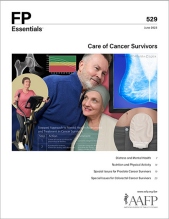
This clinical content conforms to AAFP criteria for CME.
A minority of cancer survivors meet guideline recommendations for nutrition and physical activity. There is a high prevalence of obesity in adult cancer survivors. It has been shown to increase cancer recurrence risk and be associated with poorer survival. There also is a high prevalence of malnutrition in patients with cancer. Those at highest risk include older patients, patients with advanced cancer, and patients with cancers that affect organs and body systems involved in eating and digestion. All patients with cancer should be screened regularly for the risk or presence of malnutrition. The Malnutrition Screening Tool (MST) has been validated for such screening. Individualized counseling by a dietitian can help patients achieve optimal intake. Patients should achieve adequate caloric (25-30 kcal/kg body weight) and protein (more than 1 g/kg) intake, have vitamin and/or mineral deficiencies corrected, and consider taking fish oil or long-chain N-3 fatty acid supplements. Enteral nutrition is recommended if food intake is inadequate, and parenteral nutrition can be considered if enteral nutrition is not possible or adequate. Physical activity is recommended. Standard recommendations are for at least 150 min/week of physical activity, with 300 minutes/week considered ideal. In general, supervised exercise programs have been shown to be more effective for cancer survivors than home-based exercise programs. Behavioral interventions that provide methods or materials to support behavior change (eg, fitness tracking devices, fitness classes) tend to be most effective.
Subscribe
From $350- Immediate, unlimited access to FP Essentials content
- 60 CME credits/year
- AAFP app access
- Print delivery available
Edition Access
$44- Immediate, unlimited access to this edition's content
- 5 CME credits
- AAFP app access
- Print delivery available
